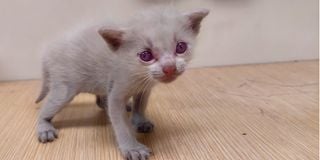Caring for an albino pet

Although albinism presents certain challenges, it doesn’t necessarily shorten a pet’s lifespan.
Albino pets are rare and captivating companions, with their striking white fur, scales, or feathers and distinctive pink or light-coloured eyes. Albinism, a genetic condition caused by the absence of melanin, can affect many species, including dogs, cats, rabbits, reptiles, rodents, and fish. This lack of pigment gives these animals their iconic appearance, but it also presents unique challenges for their care and well-being.
According to Dr Mwendwa Mulonzi, founder of Noble Veterinary Surgeons, albino animals typically have pure white coats, pinkish eyes, and light skin due to the visibility of underlying blood vessels. “It’s important to note that not all white animals are albinos,” he explains. “White non-albino animals often have darker eyes and skin pigments.”
Diagnosing albinism can be done through genetic testing, but Dr Mwendwa points out that it is often identified through physical characteristics and family history. “If an animal comes from a lineage with a history of albinism, the pet has a higher chance of being albino,” he adds.
Without melanin to protect them from the sun’s harmful rays, albino pets are prone to sunburn and skin-related conditions. Their light-sensitive eyes make bright environments uncomfortable, and some albino animals, especially cats, may experience hearing impairments or poor vision. This makes them more vulnerable to predators, meaning outdoor exposure should be carefully managed.
Dr Mwendwa emphasizes the importance of keeping albino pets safe from the sun. “These pets should avoid prolonged outdoor exposure, especially during the day, as they are at high risk for sunburns. Sunscreens approved for animals can help, but keeping them indoors is ideal,” he says. “Albino cats, in particular, are prone to skin cancers and non-healing wounds, so early detection and prevention are crucial.”
Do albino pets live normal lifespans?
Although albinism presents certain challenges, it doesn’t necessarily shorten a pet’s lifespan. Dr Mwendwa assures that with proper care, albino pets can live just as long as non-albino animals. “They deserve the same love and care as any other pet. If owners manage their environment carefully, these animals can lead happy, full lives,” he says.
Albino pets offer more than just visual novelty; they create special bonds with their owners, requiring extra attention and compassion. While their delicate needs may demand more effort, the love and joy they bring make it worthwhile. “These pets show us that beauty comes in many forms,” Dr Mwendwa concludes, “even in shades as pure as white.”





